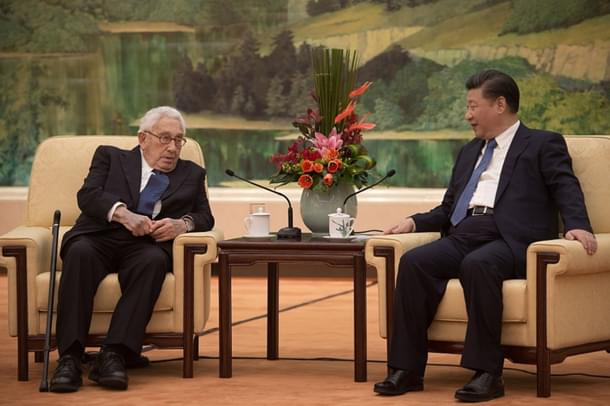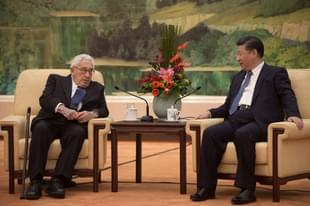World
Kissinger In China: A Potential Backchannel For Biden-Xi Negotiations?
Abhay Rathore
Jul 25, 2023, 05:00 PM | Updated 05:13 PM IST
Save & read from anywhere!
Bookmark stories for easy access on any device or the Swarajya app.


The Biden administration has been working diligently in 2023 to re-establish high-level communication with their Chinese counterparts, as per a report in Politico.
Relations between the two countries were strained after a Chinese military balloon caused a significant disruption.
The Biden administration is eager to restore regular diplomatic exchange, and as a result, Secretary of State Antony Blinken, Treasury Secretary Janet Yellen, and special presidential envoy for climate John Kerry have all made trips to Beijing.
The outcomes of these visits have been mixed. China's response has been fair but not particularly warm. Out of the three Biden policy principals who recently visited Beijing, Chinese Premier Xi Jinping only met Blinken.
However, it is worth noting that China has not shown coldness towards all Americans. Former National Security Adviser and Secretary of State Henry Kissinger received a warm welcome during his recent visit.
He not only met with Xi but also had meetings with China's top diplomat, Wang Yi, and defense minister Li Shangfu.
China's collective leadership praised Kissinger for his historic contributions to improving China-US relations and enhancing understanding between the two countries. Kissinger reciprocated the warmth, referring to himself as a "friend of China". There have even been suggestions that Kissinger, given his influence in China, could serve as a backchannel for US-China negotiations.
However, it is worth noting that China has not shown coldness towards all Americans. Former National Security Adviser and Secretary of State Henry Kissinger received a warm welcome during his recent visit. He not only met with Xi but also had meetings with China's top diplomat, Wang Yi, and defense minister Li Shangfu.
While there were hopes that Kissinger's visit could lead to improved relations, the State Department clarified in their daily briefing that Kissinger was traveling as a private citizen and not on behalf of the U.S. government.
The contrast between the warm atmosphere at the Diaoyutai State Guesthouse during Kissinger's visit and the colder atmosphere at the Great Hall of the People, where Biden officials met with their counterparts, was quite noticeable.
The mutual bonhomie between China and Kissinger can be attributed to their shared interests. China saw an opportunity to suggest that they would respond positively to US policies reminiscent of Kissinger's era, while Kissinger saw a chance to maintain his influence and relevance after leaving public office.
To understand Beijing's perspective, it is crucial to recognise the significant shift in the political climate in Washington towards the Chinese Communist Party over the past decade. Despite the polarisation of American foreign policy, there has been bipartisan consensus in viewing China as a rival rather than a partner.
This sentiment started during the Obama administration and intensified under the Trump administration with increased hostility, focusing on human rights abuses, Taiwan support, and a trade war.
The Biden administration, if anything, has accelerated the shift away from engagement and towards strategic competition in its first two years. This was evident during the tense high-level meeting between Chinese and US officials in Anchorage, Alaska, where both sides exchanged criticisms.
President Biden's statements and actions, such as strengthening alliances in the Indo-Pacific region and imposing export controls, made it clear that the United States was taking strategic competition with China seriously.
After decades of rapid engagement, initiated by Kissinger's visit to China in 1971, it is understandable that Xi and his leadership cadre long for a time when US officials prioritised opening China's market to American exports.
By celebrating Kissinger, Beijing aims to signal that relations could improve if Washington reverted to the foreign policy approaches of the past.
China has long preferred a specific diplomatic approach when dealing with the United States, which involves having a designated person to handle the China portfolio.
In the past, this role has been fulfilled by individuals such as Treasury Secretary Hank Paulsen during the George W Bush administration and national security adviser Tom Donilon during the early years of Obama's presidency.
However, this practice has not been continued in the past two administrations. By praising Henry Kissinger, China subtly expresses its desire for a return to this previous approach.
While China may be seeking to evoke nostalgia for the past in its relationship with the United States, Henry Kissinger's motivations are firmly rooted in the present.
Kissinger's reputation has suffered in recent years due to his past policy mistakes and attempts to curry favor with those in power.
Nevertheless, he is still recognised for his influence in the realm of great power politics. As US-China relations become strained, Kissinger can enhance his reputation by assuming the role of a respected senior statesperson, leveraging his intellectual acumen even in his centenarian years.
Abhay Rathore is Staff Writer at Swarajya.





